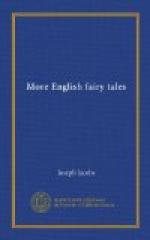Source.—Contributed to the first edition of Henderson’s Folk-Lore of the Northern Counties, pp. 333-5, by Rev. S. Baring-Gould.
Parallels.—Mr. Nutt gave a version in Folk-Lore Journal, vi., 144. The man in instalments occurs in “The Strange Visitor” (No. xxxii.). The latter part of the tale has been turned into a game for English children, “Mary Brown,” given in Miss Plunket’s Merry Games, but not included in Newell, Games and Songs of American Children.
Remarks.—This story is especially interesting as having given rise to a game. Capture and imprisonment are frequently the gruesome motif of children’s games, as in “Prisoner’s base.” Here it has been used with romantic effect.
XLVII. MY OWN SELF
Source.—Told to Mrs. Balfour by Mrs. W., a native of North Sunderland, who had seen the cottage and heard the tale from persons who had known the widow and her boy, and had got the story direct from them. The title was “Me A’an Sel’,” which I have altered to “My Own Self.”
Parallels.—Notwithstanding Mrs. Balfour’s informant, the same tale is widely spread in the North Country. Hugh Miller relates it, in his Scenes from my Childhood, as “Ainsel”; it is given in Mr. Hartland’s English Folk and Fairy Tales; Mr. F.B. Jevons has heard it in the neighbourhood of Durham; while a further version appeared in Monthly Chronicle of North Country Folk-Lore. Further parallels abroad are enumerated by Mr. Clouston in his Book of Noodles, pp. 184-5, and by the late Prof. Koehler in Orient und Occident, ii., 331. The expedient by which Ulysses outwits Polyphemus in the Odyssey by calling himself [Greek: outis] is clearly of the same order.
Remarks.—The parallel with the Odyssey suggests the possibility that this is the ultimate source of the legend, as other parts of the epic have been adapted to local requirements in Great Britain, as in the “Blinded Giant” (No. lxi.), or “Conall Yellowclaw” (Celtic Fairy Tales, No. v.). The fact of Continental parallels disposes of the possibility of its being a merely local legend. The fairies might appear to be in a somewhat novel guise here as something to be afraid of. But this is the usual attitude of the folk towards the “Good People,” as indeed their euphemistic name really implies.
XLVIII. THE BLACK BULL OF NORROWAY
Source.—Chambers’s Popular Rhymes of Scotland, much Anglicised in language, but otherwise unaltered.




